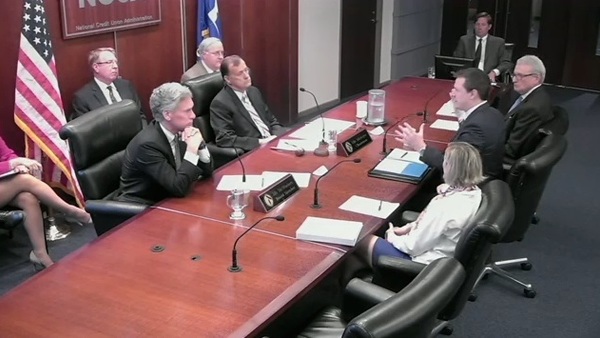Alright, last call! (... at last!) Certain you've had more than enough discussion of the share insurance fund - the NCUSIF.
Guess at least we all learned that the NCUSIF is invested in U.S. treasuries, over a 10 year, equally balanced "ladder". And, we now know that the average maturity is 5 years, the current average yield is 1.82%, and that the projected earnings of the NCUSIF are not enough to support the targeted equity ratio of the Fund and the growing budgetary needs of the NCUA.
 |
| We only have one idea, ... assess the credit unions! |
Astute readers have pointed to another alternative, which may now have eluded the Agency ... since it has failed to "ACT"... or even ask!
Here's how the NCUSIF could make a
"quick $247 million"
[based on NCUSIF's 10/31/16 financials]
to bolster the Fund...
"quick $247 million"
[based on NCUSIF's 10/31/16 financials]
to bolster the Fund...
Go back to the discussion of "unrealized gains and losses" (UGL) in Part 8 [here's the link]. You'll note that the NCUSIF portfolio had an "unrealized gain" of $475 million in June, 2016 (five months ago!). Rates had been falling all year and were spurred to new lows by the Brexit vote!
But remember that an unrealized gain/loss doesn't count toward the equity balance of the Fund - unless realized!
The NCUA staff has full authority under the existing, NCUA Board approved policy to buy and sell - any or all - investments in the NCUSIF portfolio. So, in theory, the staff could have sold the portfolio in July - booked a $475 million gain - and reinvested the next day in the identical treasury bonds - same portfolio!
Now that isn't necessarily fair (we all have great hindsight!), because there was great uncertainty about the direction of rates in the market at that time.
But take a look at Part 8 again [see link above] and what happened to the NCUSIF UGL during August ($372mil.), September ($382 mil.), October ($287 mil.).... when the FED started "promising" to raise rates in December, after the November elections! The staff could have sold in October booking a gain of $287 million - enough to cover that $300 million assessment proposed by Mr. Fazio!
The NCUA staff instead bought $800 million in 9/10 year long-term treasuries!
Why not book those unrealized gains,
while those potential gains still exist?
Why not book those unrealized gains,
while those potential gains still exist?
ACCOUNTABILITY - COMPETENCY - TRANSPARENCY
[Still time to re-position the portfolio... but the NCUA Board must "ACT" now!... before rising rates create an "unrealized loss" position.]





9 comments:
I appreciate the original intent of the management of the NCUSIF. That was a laddered non-traded investment structure so that the investment managers do not use credit union funds to speculate. The market can be a problem and very seldom does it act as you predict. This being said, the non-traded ladder made a lot of sense in 1985. Actually, it worked kind of well over the last 5 years. Investments made in 2011 now have a 5 year maturity.
Clearly, the really smart people have been suggesting that the Fed raise rates. They did try a quarter and the effect was not pretty. Janice Yellen willingness to raise rates now could be considered a political response to the Trump election. Remember the Fed does not control 10 year Treasuries. At best they control short term rates. The proposed quarter of a point increase may actually serve only to increase the cost of government borrowing and drive the 10 year rate down as overseas investors look for safety and dump funds in 10 years Treasuries! Remember most of the world still has negative interest rates!
It is a fools errand to predict the directions of rates generally. While one could argue that in the present rate structure a short term posture could be smart. If rates stay reasonably flat, over another 5 years, the Japan effect, the ladder will look pretty smart.
This is not that I would every disagree with Jim, and not support him advising the NCUSIF, I just suggest that regulatory investing is different than private investing. I also believe that it is not the duty of the NCUSIF to support NCUA's profligate spending! The NCUA Board has to control spending and the cost of the Examiner force is nothing more than Regulatory thief of member funds. NCUA simply has a spending problem and not a income problem. Time for true transparency with the budget.
A we "only buy and hold rule" even for NCUA is beyond silly... translated "nothing that occurs in the future will ever make me change my mind about what I did/knew in the past",... beyond silly... if applied in the real world most of us would be stuck acting like two-year olds... maybe some of us are!!!
Brooks.
You have no clue.
Your are fundamentally flawed throughout this post.
Blaine isn't predicting rates.
The unrealized gains were there for the taking.
Could go on but why bother.
I agree with you in real world a buy and hold strategy of bonds is suspect. However, NCUA lives in a alternative universe. In a regulatory world, it makes some sense. Their goal is safety, buy and hold ignoring the market is not necessarily safe so hold your fire, Yield is low on their list.
NCUA problem is spending, spending, spending! You wasted 12 posts not addressing the problem. Were the NCUA to change their investment strategy of the fund and get a performance like the US Central's meltdown, the cost to member would be very expensive.
You need to consider the regulatory perspective.
Well, I must agree with Bill that it's pretty obvious that I'm wasting time blogging to advocate for aa accountable, competent, transparent NCUA... it isn't happening! But, perhaps it is important to document for the future that where this is all heading should not come as a shock to credit union leaders and the NCUA Board.. kinda like the increase in interest rates that will happen tomorrow... quelle surprise!
If advocating for an accountable, competent, transparent NCUA is a waste of time, I have wasted more than 40 years of my life. I just believe that the problem with NCUA is not the investment structure of the NCUSIF. The problem started when the NCUA board decided that the Fund was a cash cow! In the real world when you income is restricted because of current interest rates, you cut expenses! NCUA in light of reduced regulatory necessities due to fewer credit unions has seen fit to increase spending annually! An accountable, competent, transparent NCUA would not be stealing from the credit union members through the NCUSIF. Right size NCUA spending first, and keep their hands off the fund more than the NCUA should charge the fund for their management. I believe we have an internal control issue where the NCUA Board gets to tax and spend member money without appropriate separation of power. The NCUA Board and senior NCUA management steal more annually than the total of money robbed from credit unions at gun point!
Must admit that still in agreement with Bill on the need to look at NCUA structure, practices, spending/budget... but thought it was important to let CU leaders know that given the increased spending and low NCUSIF earnings that CUs are going to be assessed on a regular basis going forward to pay for the lack of change in accountability. competence and transparency at NCUA. The proposed $300/600 million assessment next year is just the first installment - in a series of regular installments - that CU's will have to pay, if the NCUA Board does not "ACT" now to force change.
The major reason for this extended look at the NCUA ladder is, if continued the investment strategy locks the NCUSIF into lower than necessary earnings for the next several years - as Mr. Fazio admits and forecasts!
A ladder that works well in a declining interest rate environment does not work well in a raising rate environment - as you are about to find out - if the NCUA Board does not force a repositioning -now! (Perhaps already too little, too late, but...).
Guess I need to repeat that the obvious... the focus on the NCUSIF is because the NCUA has been funding between 65% and 73% of its operating budget (bloated or otherwise) from the earnings of the NUSIF. Projected NCUSIF earnings can no longer sustain that level of drawdown by the NCUA "zero based budgeteers!
"Just the facts, m'am!"
Fazio and company are the problem! They produce little and demand a Yuge tribute for their lack of effective productivity. Directing attention to the inefficiencies of a laddered investment strategy in a raising rate environment is interesting, but will not address the real problem!
Fazio and most of senior management was present and unaccountable for the meltdown of the corporate! Numerous credit union executives had their careers rearranged. Fazio and senior management got promotions and pay increases! Fazio if he were competent and had to actually earn the income he extracts from credit union members would have to require that NCUA employees actually earn their pay!
Fazio and senior management are foxes guarding the hen house!
Post a Comment